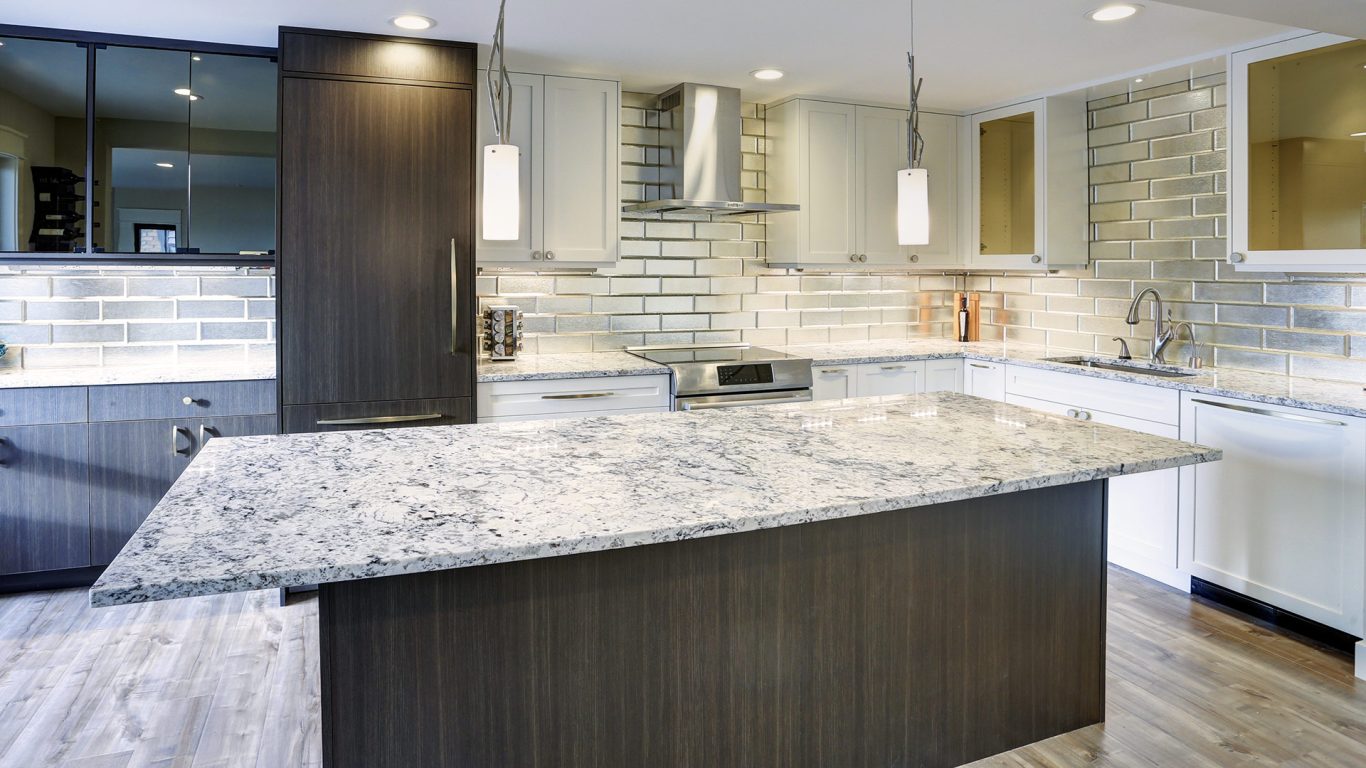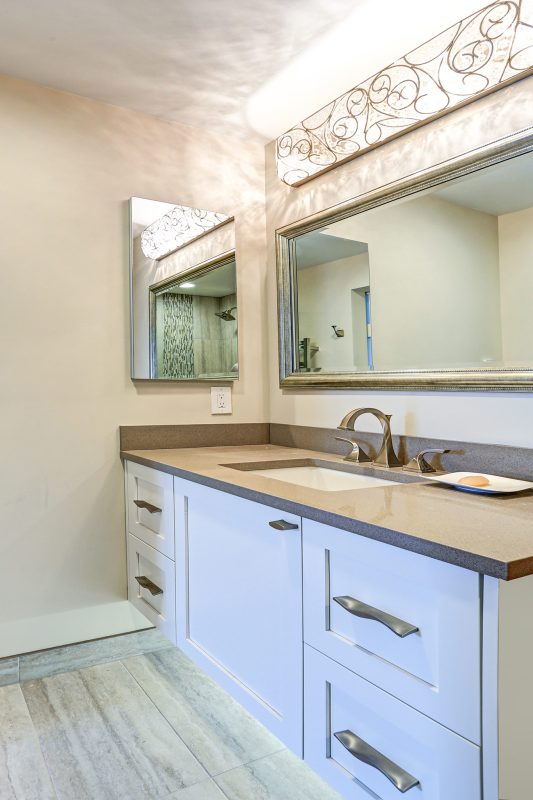
Wichita's Best
Quartz Countertops
We have one of the largest selections of Quartz countertops in Wichita. We also carry granite, marble, and many other natural stones. More than 2000 slabs on-hand.
From project design, to fabrication and installation, we are prepared to assist you every step of the way! We install quartz and stone countertops for kitchens, bathrooms, bars, fireplaces, and more. Residential, commercial, and contractor services available.
Why Quartz Countertops?
Quartz is one of the most durable stone options available. It does not scratch or chip easily. Quartz is a non-porous stone so it doesn’t require sealing. That means less maintenance compared to granite and marble. Because this countertop is made of aggregate stone material combined with resin and pigments, there are many color options. Quartz is comparably priced to medium grade granite and marble. This is one of the easiest countertops to care for and it works will in kitchens, baths, bars, fireplaces and more.
Let’s Talk About Your
Countertops
"*" indicates required fields

Quartz Countertops
Our stock varies. Visit our showroom for our latest quartz countertop stock.
Quality Upgrades
Stain Protection Warranty
Our stain warranty protects your stone for 15 years. If anything should stain it, we will come out to fix it. If for some reason we can’t fix it, we will replace the stone. If the stone is no longer available we will replace it with a stone of equal value. It’s a great piece of mind for your investment.
Dress Seam
Industry standard seams come together with a polyester resin that keeps them from separating. The resin can be matched to the color of the stone, but the seams are still visible and can be felt. With a Dress seam, we miter where the two pieces come together and smooth out the seam by hand, making it much smoother and much less visible. During installation our installers go back over the seams to make sure they are as smooth as possible.
Chip Minimizer
Our sink chip minimizer comes in handy for those little “accidents” where a pot or pan hits the edge a little too hard, causing a chip. With the sink chip minimizer we will come out and repair the edge around the sink any time you get one of those little chips. A one time repair can cost you $160 or more with each trip. This is definitely worth the upgrade!
Layout/Vein Matching
There are a lot of granite and quartz products that have veins that run through the slabs. With a Layout/Vein Match we take photo’s of your slab and lay them out in our design program so we can match up those veins for you or put precise areas of the stone on specific tops. Our designer will have you come in and view exactly how your slab will be cut and laid out.
Tear Out & Plumbing
We can tearout your old laminate, solid surface or stone tops, along with backsplash if you choose to use the same product. We can coordinate your plumbing needs, including disconnect and reconnect of sinks and cooktops.
Sinks, Faucets, & Fixtures
There is no need to shop around, we can coordinate your sink, faucets and fixtures for your project as well saving you time and making sure everything will be ready for your install.
Evening & Weekend Program
For customers that are building new homes we have special evening and weekend hours by appointment. Contact us for more information.
Quartz Countertop Pricing
We offer simple pricing programs, in addition to custom plans.
Our entry level program retails for $51 per square foot. There is no extra charge for sink or cooktop cutouts. All material is 3cm thick. We offer 3 colors of Quartz at this price point.
Colors include: Classic Brown, Classic White, and Classic Grey
We also offer a $62 per square foot plan that includes additional edge profiles and sink options. This plan has more than 13 Quartz color options: Sand Dune, Snow White, Pewter, Lagos Azul, Almond Roca, Concrete Grey, Peppercorn, Verona, Cotton, Iced White, White Star, Smoke, and Charcoal.
If these options aren’t what you’re looking for, we also provide completely custom pricing with unlimited features and options.

Quartz Countertops FAQ
If you’re thinking about quartz countertops for your kitchen or bathroom project, we’ve compiled answers to some of the most common questions we receive about the stone.
Is quartz a natural stone?
Quartz countertops are engineered. They are 90-95% natural ground quartz combined with polymers, resins and pigments. The resin binds the elements, creating a very strong, non-porous, and scratch resistant material. So quartz countertops are not natural in the sense that they are fabricated from large slabs straight from the ground the way marble and granite are. But, they are natural in the sense that most of the material comes from the earth. The term, “engineered stone” is frequently used to describe quartz.
What colors do quartz countertops come in?
Because quartz is an engineered stone it is available in hundreds of colors and styles. The color and patterns can be altered by using different pigments and materials during the engineering process. Quartz can be designed to mimic other natural stones, such as granite or marble. Colors options range from bright whites and tan colors through dark browns and blacks and everything in between.
What are the benefits of quartz countertops?
Quartz is one of the most durable stones options available, it’s less likely to scratch, crack and chip than many stones. Quartz non-porous and doesn’t require sealing, so it’s lower maintenance than granite and marble. Because the stone is made of aggregate stone material combined with resin and pigments, there are many color options. Quartz is comparably priced to medium grade granite and marble.
Are quartz countertops porous?
No. Quartz countertops are engineered with resin, making them non-porous. They will not collect bacteria, and typically don’t etch or stain in the same manner marble or granite can.
Can you cut directly on quartz?
No. While quartz is highly scratch resistant, and will often withstand a cut from a knife, you should always use a cutting board.
Can you put a hot pan on a quartz countertop?
This can be risky. Quartz is heat resistant, but not completely heat proof. Prolonged exposure to high heat can damage or discolor the resin. Typically a coffee mug or warm plate is fine, but a hot pot or pan directly from the cooktop or oven is not. It is best to user a trivet or hot pad for any hot items you place on the countertop.
Does quartz stain easily?
Quartz countertops are one of the most stain resistant products you can buy. Under normal use, stains are rare. Some chemicals and solvents can damage the resin used in quartz, so it is important to review your manufacturer’s warranty. Avoid getting bleach, nail polish remover, cooking grease, marker, drain cleaner and highly acidic or highly alkaline chemicals on granite. These items can damage the resin and or discolor the pigments. If you do get any of these chemicals on your quartz countertops, be sure to clean them up quickly to avoid staining. Quick cleanup of any spill is a good rule to follow in general.
Do quartz countertops need to be sealed?
No. Quartz is non-porous and doesn’t require sealing.
Can quartz be used outdoors?
No. Prolonged exposure to direct sunlight and UV rays can case quartz to fade. This is particularly true for darker colored stones. Fading is not an issue for typical indoor use.
How do you clean quartz?
Quartz countertops can be cleaned with a mild detergent and warm water. Just scrub lightly with a soft towel or microfiber cloth. Avoid rough cloths, and never use scrubbing brushes or steel wool on quartz. For hardened spills, you can scrape quartz with a soft plastic or rubber tool, for example a rubber spatula. Never use metal tools, and always be careful not to drive sharp edges into the stone as the resin can be damaged. Never use harsh or abrasive chemicals on quartz, this includes bleach, ammonia, and window cleaners with high pH levels. Your stone manufacturer may also suggest cleaning products for you specific stone. Check your warranty and installation details to see what other products are safe for your countertops.
Do Quartz countertops have seams?
Yes, unless the slab size and countertop design allows for single slab placement. However, when installed properly quartz seams aren’t very noticeable. The design and layout process should include a discussion about where on the countertop the seams will be placed. Professional installation should mean that seams almost invisible.
Where can quartz be used?
Quartz is ideal for kitchen countertops, bathroom counters and vanity tops, fireplace surrounds, backsplashes, bar tops, desks and more. Quartz should not be used outdoors as extreme and long-term direct exposure to ultraviolet light can cause it to discolor with time.
Do quartz countertops show fingerprints?
Yes, but they are no worse than most other countertop finishes. A darker color and/or a more glossy finish will show more fingerprints than a matte finish and bright color. Quartz is very easy to clean, so more frequent wipe downs may be required if you opt for a very dark quartz.
How do you get glue off of quartz?
It is possible to remove Gorilla Glue, Crazy Glue and other super glues from your quartz countertop. You just need three tools, and a gentle hand. See our Quartz vs. Glue blog.
